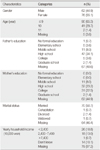Abstract
Purpose
There is evidence that parent-child cohesion is a potentially influential factor in children's self-esteem and acculturation. However, no research to date has examined cohesion with parents as a potential pathway between Korean proficiency and self-esteem or acculturation among children from multicultural families. This study was done to address these limitations by examining whether and to what extent cohesion with parents mediated the effect of Korean proficiency on self-esteem and acculturation among children from multicultural families.
Methods
Data were collected from a sample of 138 mothers and their children living in Seoul, Daegu, Kyungi province, and Kyungpook province. Multiple regression analysis was used to examine the relationships between the variables of interest. Mediation effects of cohesion with parents were tested by following the procedure recommended by Baron and Kenny (1986).
Results
Cohesion with parents partially mediated the relationship between Korean proficiency and self-esteem. For children's acculturation, the effect of Korean proficiency was partially mediated through father-child cohesion. Mother-child cohesion completely mediated the relationship between Korean proficiency and acculturation.
Figures and Tables
References
1. Baron RM, Kenny DA. The moderator-mediator variable distinction in social psychological research: Conceptual, strategic, and statistical considerations. J Pers Soc Psychol. 1986. 51:1173–1182. http://dx.doi.org/10.1037/0022-3514.51.6.1173.
2. Berry JW. Immigration, acculturation, and adaptation. Appl Psychol. 1997. 46:5–34. http://dx.doi.org/10.1111/j.1464-0597.1997.tb01087.x.
3. Cauce A, Reid M, Ramey S, Gonzales N. Sarason BR, Sarason IG, Pierce GR, editors. Social support in young children: Measurement, description, and behavioral impact. Social support: An interactional view. 1990. New York: John Wiley & Sons;64–94.
4. Fujiki M, Spackman MP, Brinton B, Hall A. The relationship of language and emotion regulation skills to reticence in children with specific language impairment. J Speech Lang Hear Res. 2004. 47:637–646.
5. Harter S. The perceived competence scale for children. Child Development. 1982. 5387–97.
6. Jeong HS. Issues and policy tasks of Korean juveniles' socialization process. Korean J Youth Stud. 2009. 16(11):279–296.
7. Kim EJ, Cain K, McCubbin M. Maternal and paternal parenting, acculturation, and young adolescents' psychological adjustment in Korean American families. J Child Adolesc Psychiatr Nurs. 2006. 19(3):112–129.
8. Kim YR, Kim YT. Linguistic performance of Korean children from low SES multicultural families. J Speech Hear Disord. 2011. 20(3):73–88.
9. Koh MS. Influence of parents' child rearing attitudes on family cohesion and self-esteem in adolescents. J Korean Acad Child Health Nurs. 2010. 16(3):195–202. http://dx.doi.org/10.4094/jkachn.2010.16.3.195.
10. Koo HJ. A structural equation modeling analysis of influence of language, cognitive, and social and emotional development on the children with aggressive behavior at multi-cultural families in agricultural & fishing areas. Korean J Early Child Spec Educ. 2009. 9(3):1–21.
11. Kwak KJ. Development and adaptation of multicultural children: Focus on pattern and effect of interaction between parents and their children in multicultural family. Paper presented at the Annual Meeting of the Korean Psychological Association. 2008. Seoul.
12. Kweon HY, Lee MS, Jeon BU. The literature analysis on the language development of the children from multicultural families. Educ J Phys Mult Disabl. 2010. 53(4):283–306.
13. Lee YJ. Adjustments of children's characteristics in multi-culture families: A study on risk and protective factors. Korean J Fam Welf. 2008. 13(1):79–101.
14. McCabe PC, Meller PJ. The relationship between language and social competence: How language impairment affects social growth. Psychol Sch. 2004. 41:313–321. http://dx.doi.org/10.1002/pits.10161.
15. Ministry of Public Administration and Security. 2011 status of foreign residents in local government. 2011. Seoul: Author.
16. Nam SA, Baik JS. The effects of parenting attitude on school adjustment and self-esteem of child and early adolescent from multicultural families. J Korea Inst Youth Facil Environ. 2011. 9(1):3–12.
17. Nho CR, Hong JJ. Adaptation of migrant workers' children to Korean society. J Korean Soc Child Welf. 2006. 22:127–159.
18. Oh JY, Song MS. A study on factors that affect the adaptive behavior in kindergarten of children from foreign mother's families. J Korea Open Assoc Early Child Educ. 2009. 14(1):251–269.
19. Olson DH, Sprenkle DH, Russell CS. Circumplex model of marital and family systems: I. Cohesion and adaptability dimensions, family types, and clinical applications. Fam Process. 1979. 18:3–28. http://dx.doi.org/10.1111/j.1545-5300.1979.00003.x.
20. Pae SY, Kwak KJ, Kim KY, Jung KH, Kim HJ. Supporting the language development of children from multicultural families: A survey of mothers and developmental supporters. J Speech Hear Disord. 2009. 18(4):165–184.
21. Park HM, Moon ST, Yang JH. The effect of elementary school children's attachment on self-esteem and learning motivation. J Korean Pract Arts Educ. 2002. 15(3):113–125.
22. Park JH. Influence of the adolescent-parent relationship on the school adjustment. 2003. Hannam University: Daejeon;Unpublished master's thesis.
23. Park MS. Mothers' Korean proficiency and children's self-esteem in multi-cultural families. Health Soc Welf Rev. 2010. 30(2):193–218.
24. Rumbaut RG. Booth A, Crouter AC, Landale N, editors. Ties that bind. Immigration and the family: Research and policy on U.S. immigrants. 1997. Mahwah, NJ: Lawrence Erlbaum Associates.
25. Shin YJ, Youn CY. Bicultural adjustment, peer relationship and bicultural acceptance attitude of children in multi-cultural family. J Play Ther. 2010. 14(2):1–14.
26. Won JS. Language education program for the elementary school children in multicultural families. J Elementary Korean Educ. 2009. 40:158–187.
27. Yang JH, Park HJ, Kim SS, Kang EJ, Byun SH, Bang JS. Adaptation experience to family of immigrant women in multicultural families. J Korean Acad Nurs. 2012. 42(1):36–47. http://dx.doi.org/10.4040/jkan.2012.42.1.36.
28. Yoo HJ, Kim HH, Kim WS, Shin JC. Articulation ability and phonological process in multicultural family children. Speech Sci. 2008. 15(3):133–144.
29. Yoon SG. Relationship among family function, parent-children communication and adolescent self-efficacy of multi-cultural families. 2011. Seoul: Kwangwoon University;Unpublished master's thesis.




 PDF
PDF ePub
ePub Citation
Citation Print
Print







 XML Download
XML Download